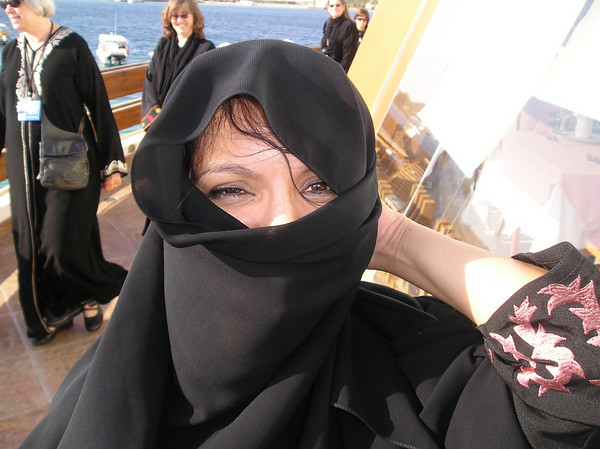Saudi HospitalityIt is after midnight and today has proven to be the kind of day I hoped for when applying for this program. It feels like we are peeling off the layers of an onion, slowly growing in our understanding of Saudi culture. Conversations with Saudis at Aramco, in schools, and in industry are challenging the assumptions many of us arrived with.
 Henna Tattoos
Henna Tattoos

 Student Art Dhahran Aliyyah SchoolCollege Prep Centers
Student Art Dhahran Aliyyah SchoolCollege Prep CentersSaudi Aramco is a company that plans and invests in its future. The operating budget for the Development division is 0
ver 600 million. This money is spent on creating a comprehensive recruitment plan of the brightest and talented Saudi boys and girls. The company recruits the top private and public school students, gives them a year of intense college preparation classes, then sends them off to universities in the Kingdom and around the world.
 College Prep Students
College Prep Students
We visited two such centers today, one for young men, and the other for young women. These kids are amazing. Speaking fluent English, they readily answered our questions. Most major in some type of engineering, either petroleum or chemical. The officials at Aramco said if students want a lucrative job upon graduation, they should major in petrochemical engineering.
Our team asked students how they felt about being segregated from each other. Most said it makes no difference to them because that's how they have grown up. it is the only lifestyle they know. Most have traveled outside of the Kingdom and are familiar with Western ways. Some have participated in the Johns Hopkins Summer Program, the same one some L.A. Academy students attend!
Without a doubt, however, it is the male students live distinct lives from the females. For example, fathers cannot attend their daughters graduations. It is only for females. Mothers cannot speak face to face with male teachers. They must speak by phone only. If a special guest speaker were to come to
Dhahran, only the males would be allowed to see him/her. The girls would see through remote video. Women are not allowed to drive and must be accompanied by a male relative when in public. They cannot leave the country without the permission of their oldest male relative. When asked about this, many agreed that to continue advancing as a nation,
womens' roles would have to change. But it was pointed out that Saudi Arabia is a young country, only about 70 years old. What was US culture like in the 1840's when we were 70 years old? Very similar to how Saudi culture is now. Women could not be alone with a man, they
dressed very
conservatively, and there was tremendous respect for the family structure.
Dhahran Aliyyah SchoolAt the private school we visited, no males were allowed in the girls side. The teachers and female parents and workers did not allow their
picture to be taken. The culture prescribes that due to modesty, women should wear the
abaya to cover their body, and the
hijab to cover their head. This is so no one outside of the family can see their bodies. For this same reason, many women do not want to show their face or bodies to strangers by way of pictures.


 Lockers and Art
Lockers and ArtStudents begin to learn English since
Pre-K. In fact, we saw many signs that said "English Only". Many Saudis know English and other languages as well. It was interesting to note that our fellow Saudi educators also must teach a curriculum determined by the Saudi education authorities. I thought this was just a US situation, but its worldwide!
We observed a model lesson taught by a young Saudi teacher who went to high school and college in the US. The 12
th grade girls were wearing a school uniform skirt, but had the funkiest tennis and shoes on. They wore no makeup, but very stylish tops. Most said they owned two or three
abayas, and chose the designs they liked. They asked why America had so many problems like drugs, violence, and teenage pregnancies. How do you answer that question?
Although Arabia does not have movie theaters, many families have satellite TV and watch American shows like Gray's Anatomy and the Hills. They have
Internet access and visit
websites such as
Facebook and
MySpace. They download the latest music on
their Ipods and are very tech savvy.
 Graduation Decorations
Graduation Decorations
 College Prep Students
College Prep Students
Some college prep women did not mind their picture taken. They were very open, positive, and absolutely
zealous about what the future held for them. They will be among the first Aramco women to be sponsored to get advanced degrees and to return to work for their company. What does this mean? The company:
- pays for their university
- pays for apartments, food, books, flights
- prepares them at the college prep centers for free
- offers them a LIFETIME job at Saudi Aramco
All they have to do is finish college with a degree related to the oil industry and return to Saudi Arabia. What happens if they fall in love and marry an American? If they stay in the U.S., they have to pay back all the money that was invested in them. If the male wants to convert to Islam and come live in the Kingdom, he is welcome.
Leaving the tours of the schools was uplifting because I saw the eagerness with which young Saudis want to communicate with young Americans. They want you to know they are regular teens just like you. They have hopes and dreams and want you to know they are not oppressed and are not terrorists.
Cultural Celebration
In the evening we were treated to a feast that we could never have imagined we would ever take part in. It was held in a private country club owned by Saudi royalty. There was a live ensemble of musicians, singers, and dancers who entertained us all night. I couldn't help but get up and dance the hypnotic and mystical music.
There were camels transported to the city for us to ride and take pictures of. Tents were set up and the Arabian coffee and tea flowed endlessly. Henna
tattoos were given to anyone who wanted one, and even the guys had their wives names or colleges printed on their arms! To tell you the truth, I didn't want the night to end. We went way past our scheduled time and did some serious cultural exchanges tonight!
 Arabian Coffee
Arabian CoffeeTomorrow we wear our
abayas for the first time. All the teachers were excited to receive theirs, and do you know, each and every one of ours was different, customized with unique embroidery or hand drawn art. We ran to our rooms to see what they looked like and for being Americans, we sure were eager to try them on!




Have a great day everyone.
























































